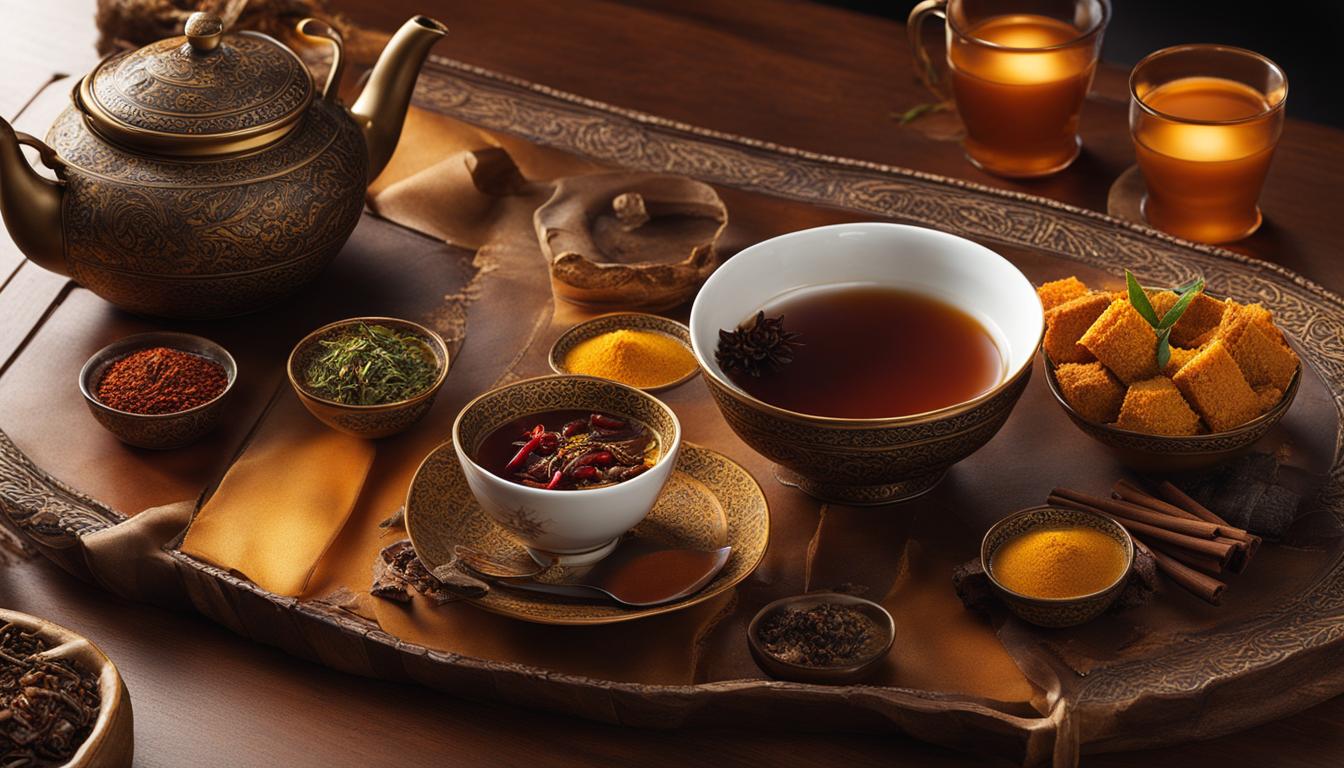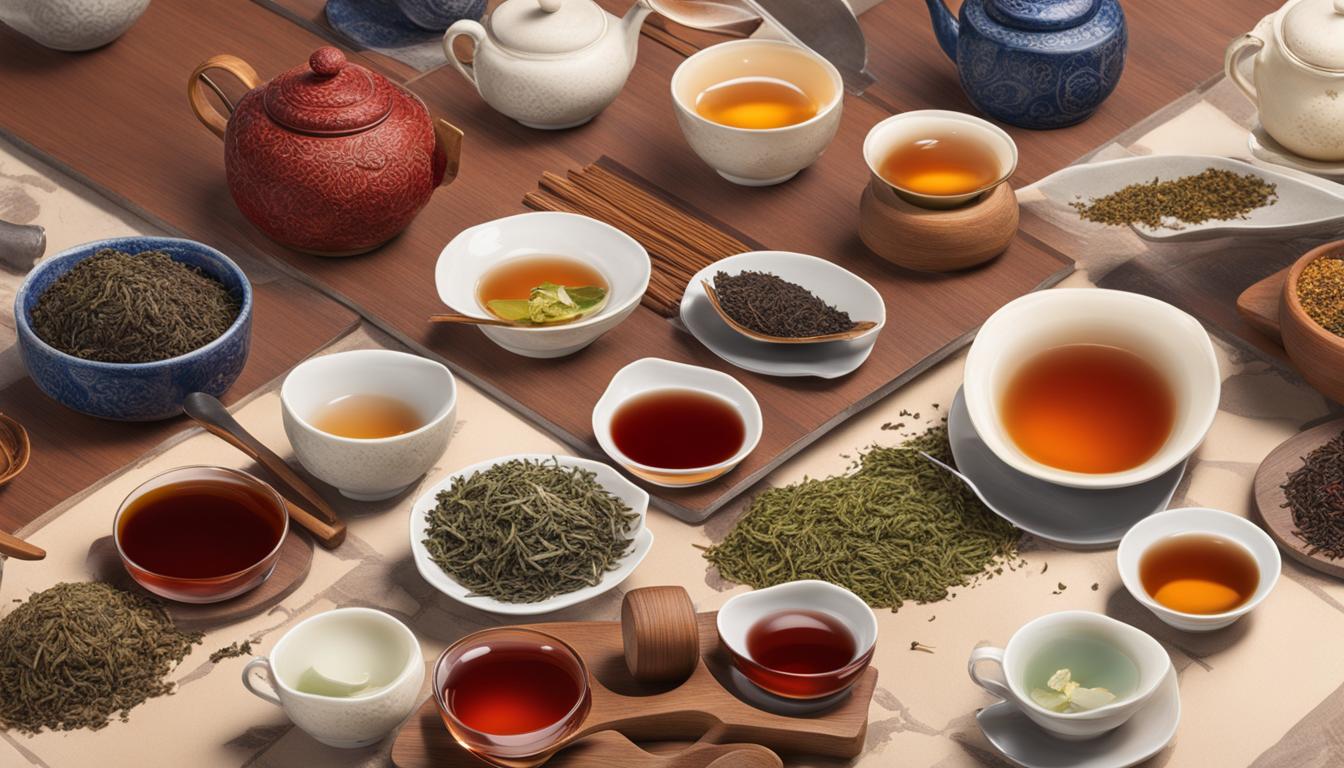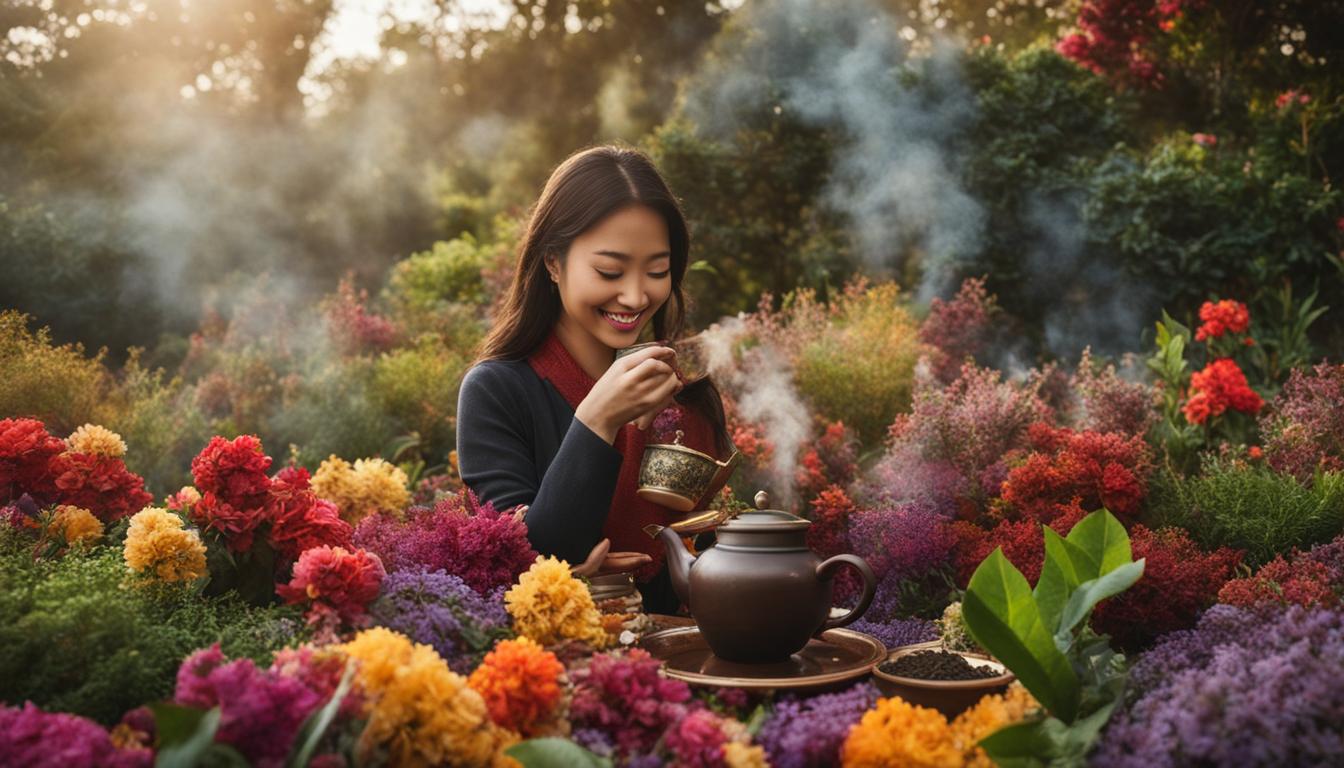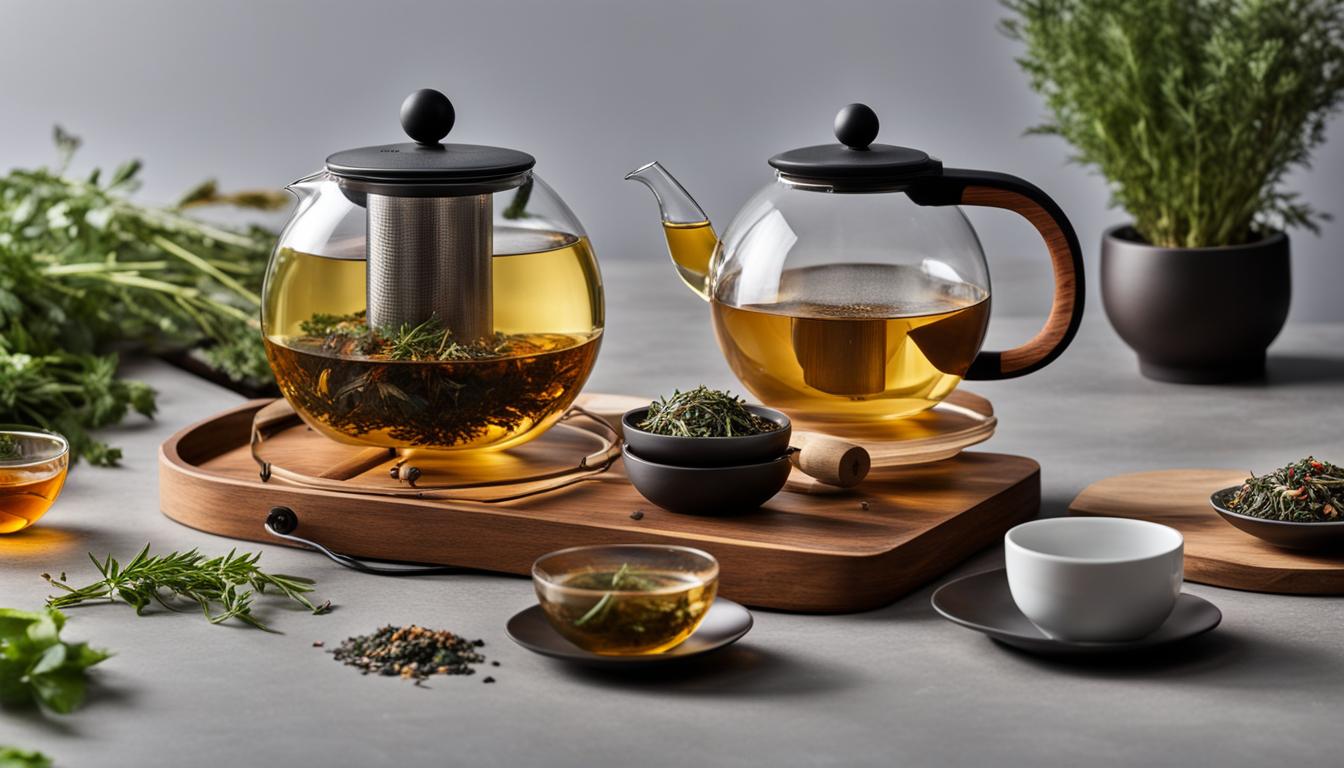Greetings, fellow food enthusiasts! Are you ready to embark on a flavor-packed journey that will take your spicy meals to new heights? Look no further, because we’ve got the ultimate solution for you: spiced teas. Now, you might be wondering, can a humble cup of tea truly enhance the bold and fiery flavors of your favorite dishes? Oh, yes! With their exotic aromas and tantalizing tastes, spiced teas are the perfect complement to any spicy culinary adventure.
Imagine savoring a sip of turmeric tea with its earthy richness while indulging in a perfectly spiced curry. Or perhaps a comforting cup of cinnamon tea that adds a warm and sweet touch to your favorite fiery stir-fry. These teas, along with ginger tea, cardamom tea, and clove tea, not only offer a symphony of flavors but also bring a myriad of health benefits to the table. From their antioxidant properties to their soothing effects on digestion, these spiced teas are a winning combination when paired with spicy dishes.
Key Takeaways:
- Spiced teas are a delightful way to enhance the flavors of your spicy meals.
- Turmeric tea, cinnamon tea, ginger tea, cardamom tea, and clove tea are popular options known for their unique flavors.
- These teas offer a range of health benefits, from antioxidants to soothing digestion.
- By exploring the world of spiced teas, you can elevate your culinary adventures and enjoy a satisfying complement to your spicy dishes.
- So, why not spice up your tea collection and embark on a flavorful journey today!
The History of Spices and Tea
Spices have a fascinating history that stretches back to ancient civilizations. They were prized for their unique flavors and healing properties, becoming an integral part of cultural traditions. Ancient civilizations, such as those in India, China, and Egypt, recognized the value of spices and incorporated them into their daily lives.
The spice trade route played a crucial role in the spread of spices across different regions, connecting cultures and shaping culinary traditions. Spices were not only used for culinary purposes but also for medicinal and religious rituals. They were believed to have healing properties and were used to ward off evil spirits.
Tea, on the other hand, has its origins in ancient China. It began as a medicinal beverage and gradually gained popularity as a refreshing drink. The blending of spices with tea to create spiced tea blends has a rich history. This practice allowed people to enjoy the comforting flavors and the therapeutic benefits of both tea and spices.
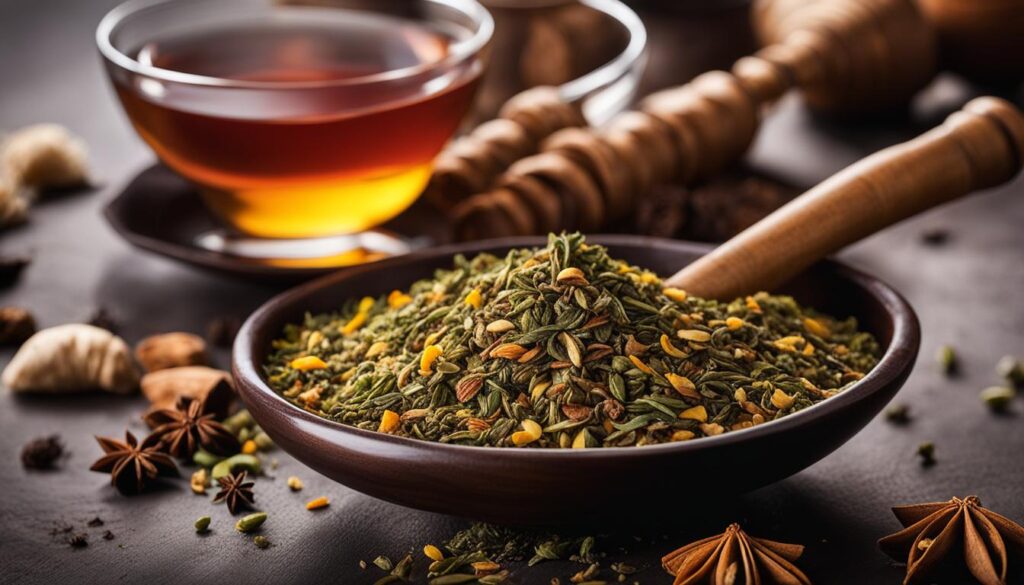
Ancient Civilizations and the Spice Trade Route
“The spice trade route connected ancient civilizations, allowing the exchange of spices, knowledge, and cultural traditions.”
| Spices | Origin | Common Uses |
|---|---|---|
| Cinnamon | Sri Lanka, India | Culinary, medicinal |
| Cardamom | India, Guatemala | Culinary, digestive aid |
| Turmeric | India | Culinary, anti-inflammatory |
| Ginger | India, China | Culinary, digestive aid |
| Cloves | Indonesia, Madagascar | Culinary, medicinal |
The history of spices and tea is a testament to the rich tapestry of human civilization. Today, we can still enjoy the flavors and benefits of spiced teas, connecting us to ancient traditions and cultures.
Exploring Spiced Tea Varieties
When it comes to spiced teas, there is a wide variety of options to choose from. Each tea offers its own unique flavor profile and health benefits, making them a perfect complement to spicy meals. Let’s take a closer look at some of the popular spiced tea varieties:
Turmeric Tea
Turmeric tea, also known as “Indian Saffron,” is known for its vibrant golden color and robust, earthy flavor. It is often praised for its antioxidant properties and potential anti-inflammatory effects. This tea is a great choice for those looking to add some warmth and depth to their beverage.
Cinnamon Tea
Cinnamon tea is a beloved choice for its warm and spicy-sweet taste. Not only does it offer a delightful aroma, but it is also associated with various health benefits, such as supporting healthy blood sugar levels and providing antioxidant properties.
Ginger Tea
Ginger tea has a zesty flavor that adds a delightful kick to any cup. It is commonly praised for its soothing effects on digestion, making it a popular choice after a spicy meal. Additionally, ginger tea is known for its potential anti-inflammatory and immune-boosting properties.
Cardamom Tea
Cardamom tea, often referred to as the “queen of spices,” is famous for its warm aroma and intense flavor. It is frequently used in traditional Ayurvedic medicine for its potential digestive benefits, and it adds a touch of exoticness to any tea blend.
Clove Tea
Clove tea offers a potent aroma and a distinct sweet flavor. It is commonly used in baking and mulled drinks, and it brings a unique richness to the tea. Clove tea is often associated with potential antimicrobial and antioxidant properties.
These spiced tea varieties can be enjoyed hot or iced, making them versatile options for any time of the year. Whether you’re seeking a bold and robust flavor or a soothing and aromatic cup, there’s a spiced tea perfect for enhancing your spicy meals.
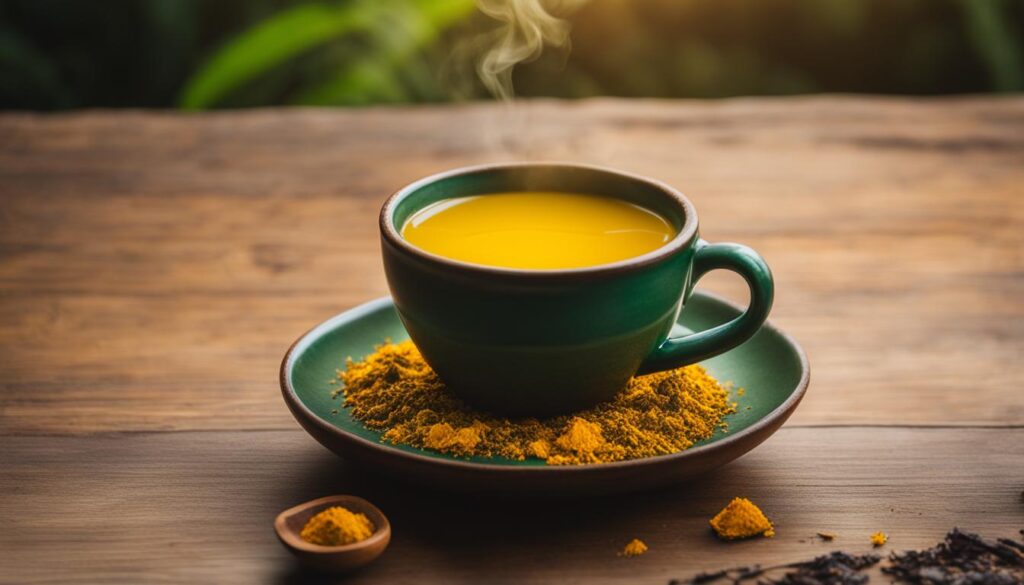
The Art of Making Chai Tea
Chai tea, also known as masala chai, is a traditional Indian blend of strong black tea and a combination of aromatic spices. It is a popular beverage that is enjoyed for its rich flavors and soothing properties. Making the perfect chai tea requires careful attention to the spices used, the brewing process, and the choice of ingredients.
One of the key ingredients in chai tea is cardamom pods, which add a warm and fragrant aroma to the brew. Black peppercorns provide a subtle hint of spice, while cinnamon lends a sweet and comforting taste. Fresh ginger root adds a zesty kick, and when combined with the other spices, creates a harmonious blend of flavors.
To make the best chai tea, it is recommended to use a strong black tea, such as Assam, to ensure a robust and full-bodied flavor. It is also important to bring full-fat milk to a boil multiple times, as this enhances the nutty and sweet taste of the tea. The spices should be ground coarsely to release their flavors gradually, and crushed ginger root should be added towards the end of steeping for a bright and refreshing twist.
Finally, sugar is used to balance the heat from the spices and the richness of the milk. The amount of sugar can be adjusted according to personal preference, ensuring a perfect balance of flavors. With the right combination of ingredients and a little bit of practice, you can create a delicious and authentic cup of chai tea that will transport you to the streets of India.
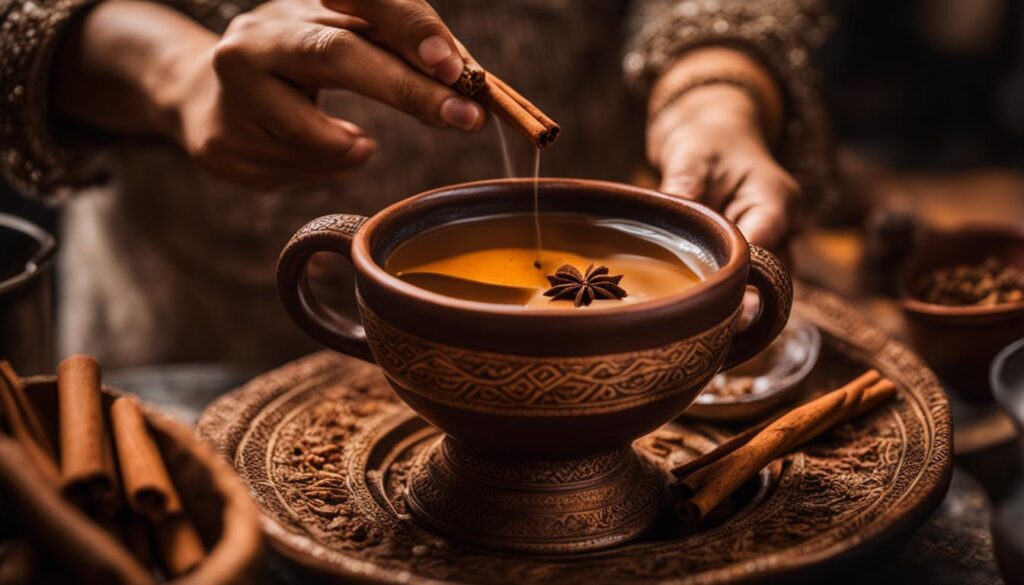
The Perfect Chai Tea Recipe
| Ingredients | Amount |
|---|---|
| Strong black tea (Assam) | 2 teaspoons |
| Cardamom pods | 4-5 |
| Black peppercorns | 4-5 |
| Cinnamon stick | 1 small piece |
| Fresh ginger root | 1-inch piece, crushed |
| Full-fat milk | 1 cup |
| Sugar | To taste |
“Chai tea is not just a beverage, it’s an experience. The combination of aromatic spices, bold black tea, and creamy milk creates a symphony of flavors that delights the senses. So take a moment to savor the art of making chai tea and indulge in its warm and comforting embrace.”
The Delight of Floral Infused Teas
Scented teas offer a delightful combination of tea leaves and flower petals. In Chinese tea production, flowers like osmanthus, jasmine, and rose are allowed to mingle with tea leaves, infusing their soothing characters into the brew. For example, Ceylon or Indian tea leaves can be steeped with lavender buds for a fragrant twist. Chinese black tea can be finished with a few drops of pure distilled rose flower water for a stress-relieving experience. These floral infused teas provide a calming and aromatic experience that complements spicy meals.
Table: Floral Infused Tea Varieties
| Tea Variety | Flower Infusion | Flavor Profile |
|---|---|---|
| Ceylon Tea | Lavender Buds | Fragrant and Floral |
| Indian Tea | Rose Petals | Stress-Relieving and Subtly Sweet |
| Chinese Black Tea | Rose Flower Water | Calming and Aromatic |
These floral infused teas not only provide a delightful sensory experience but also boast numerous health benefits. Lavender is known for its calming properties, while rose petals are rich in antioxidants. Rose flower water has been used for its soothing effects on the mind and body for centuries. By incorporating these floral infusions into your tea routine, you can elevate your tea-drinking experience and indulge in the delicate flavors and aromas.
Green Teas for a Zesty Pairing
When it comes to pairing teas with spicy dishes, green teas offer a refreshing and zesty complement. With their delicate flavors and vibrant profiles, green teas can elevate the dining experience and provide a delightful twist to spicy flavors. Let’s explore some popular green tea varieties and their unique flavor combinations.
Gunpowder Green Tea with Dried Spearmint
Gunpowder green tea, known for its slightly smoky and earthy flavor, pairs exceptionally well with dried spearmint. The combination of these two ingredients creates a Moroccan-inspired blend that tantalizes the taste buds. The robustness of the gunpowder green tea balances the herbaceous and refreshing qualities of dried spearmint, resulting in a zesty and aromatic infusion.
Green Tea with Dried Lemon Peel
Looking to add a citrusy bite to your tea? Look no further than green tea infused with dried lemon peel. This combination provides a subtle tanginess to the tea, enhancing its refreshing qualities. The bright and zesty flavors of the lemon peel elevate the green tea, creating a refreshing and invigorating beverage.
Japanese Kukicha with Sansho Peppercorns
For those seeking an exciting and unique pairing, Japanese kukicha with crushed sansho peppercorns is a must-try combination. Kukicha, made from the stems of green tea, offers a slightly nutty and sweet taste. When brewed with sansho peppercorns, which have a bright and citrusy flavor with a hint of spice, the resulting infusion provides a delightful contrast of flavors that awaken the palate.
Green teas offer a range of exciting flavor pairings that enhance the dining experience. Whether it’s the Moroccan-inspired blend of gunpowder green tea and dried spearmint, the refreshing combination of green tea with dried lemon peel, or the unique pairing of Japanese kukicha with sansho peppercorns, these teas add a zesty twist to your spicy meals. So, next time you indulge in a spicy dish, consider reaching for a cup of green tea to accompany your culinary adventure.
Health Benefits of Herbal Teas
When it comes to promoting overall wellness, herbal teas are a natural and flavorful choice. From calming chamomile to soothing peppermint, these teas offer a range of health benefits that can enhance your daily routine. Let’s explore the incredible properties of some popular herbal teas:
Chamomile Tea:
This gentle and aromatic tea has been used for centuries to promote relaxation and improve sleep quality. Chamomile tea can also aid in digestion and help control blood sugar levels. Sip a warm cup before bed to unwind and experience its calming effects.
Peppermint Tea:
Known for its refreshing and invigorating flavor, peppermint tea is a favorite for many. It supports digestive health, alleviates bloating and gas, and offers antioxidant and antibacterial properties. Enjoy a cup after a meal to soothe your stomach and refresh your senses.
Ginger Tea:
This zesty and warming tea is a go-to remedy for nausea, motion sickness, and digestive discomfort. Ginger tea also exhibits powerful anti-inflammatory effects, making it a great choice for those looking to reduce inflammation in the body. Sip on ginger tea to ease digestion and promote overall well-being.
Hibiscus Tea:
Bright and tart, hibiscus tea is packed with antioxidants and offers numerous health benefits. It helps reduce blood pressure, improve cholesterol levels, and decrease oxidative stress. Enjoy this vibrant tea hot or iced for a refreshing and health-enhancing treat.
Echinacea Tea:
Known for its immune-boosting properties, echinacea tea can help strengthen your body’s defense system. It may also shorten the duration and severity of the common cold. Sip on echinacea tea when you feel a cold coming on or to support your overall immune health.
Rooibos Tea:
Originating from South Africa, rooibos tea is caffeine-free and rich in antioxidants. It may improve bone health, reduce the risk of heart disease, and aid in weight management. This flavorful tea is a great alternative to black or green tea and can be enjoyed at any time of the day.
Sage Tea:
Sage tea has been used for centuries for its medicinal properties. It improves cognitive function, memory, and attention span, making it a popular choice for students or those looking for a brain boost. Including sage tea in your routine may also support heart health and reduce inflammation.
Lemon Balm Tea:
Lemon balm tea offers a refreshing citrus flavor and a range of health benefits. It increases antioxidant levels in the body, improves arterial stiffness, and may help with sleep and anxiety. Sip on this delightful tea when you need a moment of tranquility or a natural stress-reliever.
Rose Hip Tea:
This vibrant and fruity tea is packed with vitamin C and offers potent anti-inflammatory properties. Rose hip tea may aid in reducing inflammation in the body, support weight management, and promote healthy skin. Enjoy it hot or cold for a refreshing and nourishing boost.
Passionflower Tea:
Known for its calming effects, passionflower tea is often used to promote better sleep, reduce anxiety, and improve mood. Sip on a cup before bedtime to relax and unwind, or enjoy it throughout the day for a sense of tranquility.
These herbal teas offer a delightful and flavorful way to enhance your well-being. Whether you’re looking to relax, soothe digestion, boost your immune system, or simply enjoy a delicious cup of tea, there’s an herbal blend perfect for you.
| Tea | Health Benefits |
|---|---|
| Chamomile Tea | Calming, improves sleep quality, aids digestion, helps control blood sugar levels |
| Peppermint Tea | Refreshing, supports digestive health, offers antioxidant and antibacterial properties |
| Ginger Tea | Zesty and warming, relieves nausea and digestive discomfort, exhibits anti-inflammatory effects |
| Hibiscus Tea | Reduces blood pressure, improves cholesterol levels, decreases oxidative stress |
| Echinacea Tea | Boosts the immune system, shortens the duration of the common cold |
| Rooibos Tea | Caffeine-free, rich in antioxidants, improves bone health, reduces heart disease risk, aids in weight management |
| Sage Tea | Improves cognitive function, supports heart health, reduces inflammation |
| Lemon Balm Tea | Increases antioxidant levels, improves arterial stiffness, helps with sleep and anxiety |
| Rose Hip Tea | High in vitamin C, reduces inflammation, supports weight management, promotes healthy skin |
| Passionflower Tea | Calming, promotes better sleep, reduces anxiety, improves mood |
Conclusion
Spiced tea offers a delightful array of flavors and a multitude of health benefits that perfectly complement spicy meals. Whether you’re a fan of the rich and earthy notes of turmeric tea or the warm and sweet taste of cinnamon tea, there is a spiced tea to suit every palate. The art of making chai tea, with its traditional Indian blend of fragrant spices, enhances the spicy flavors of any dish.
For a calming and aromatic experience, floral-infused teas are the way to go. The combination of tea leaves with flower petals creates a soothing and fragrant brew that adds an extra layer of enjoyment to your spicy meals. And let’s not forget about green teas, which provide a refreshing and zesty pairing for spicy dishes. From gunpowder green tea with dried spearmint to Japanese kukicha with sansho peppercorns, these teas offer a unique flavor combination that will tantalize your taste buds.
But it’s not just about the flavors and aromas. Spiced teas also come with a host of health benefits. Chamomile tea promotes better sleep and digestion, while ginger tea helps with nausea and inflammation. Hibiscus tea aids in lowering blood pressure, and rooibos tea may improve bone health. With herbal teas like peppermint, echinacea, and sage, you can boost your immune system and cognitive function. These teas offer a natural and flavorful way to support your overall well-being.
So, as you embark on your culinary adventures, don’t forget to explore the world of spiced teas. With their flavor pairings, health benefits, and aromatic experiences, they are the perfect complement to your spicy dishes. Cheers to the joys of spiced tea!
FAQ
What are some popular spiced tea varieties?
Some popular spiced tea varieties include turmeric tea, cinnamon tea, ginger tea, cardamom tea, and clove tea.
What are the health benefits of spiced teas?
Spiced teas offer a range of health benefits, including antioxidant properties and soothing effects on digestion.
What is masala chai?
Masala chai is a classic spiced tea blend from India, made with strong black tea and a blend of spices like cardamom, cinnamon, and cloves.
How do you make the best chai tea?
To make the best chai tea, use a strong black tea, bring full-fat milk to a boil multiple times, grind the spices coarsely, add crushed ginger root, and use enough sugar to balance the spice heat and richness of the milk.
What are floral infused teas?
Floral infused teas are a delightful combination of tea leaves and flower petals, such as osmanthus, jasmine, and rose, which infuse their soothing characters into the brew.
Which teas pair well with zesty flavors?
Green teas, like gunpowder green tea and Japanese kukicha, pair well with zesty and bright flavors like dried spearmint, dried lemon peel, and crushed sansho peppercorns.
What are the health benefits of herbal teas?
Herbal teas offer various health benefits, such as calming effects (chamomile tea), digestive support (peppermint tea), anti-inflammatory properties (ginger tea), and immune-boosting properties (echinacea tea).
How do spiced teas complement spicy meals?
Spiced teas provide a range of flavors that enhance spicy meals, and their health benefits promote overall wellness.

